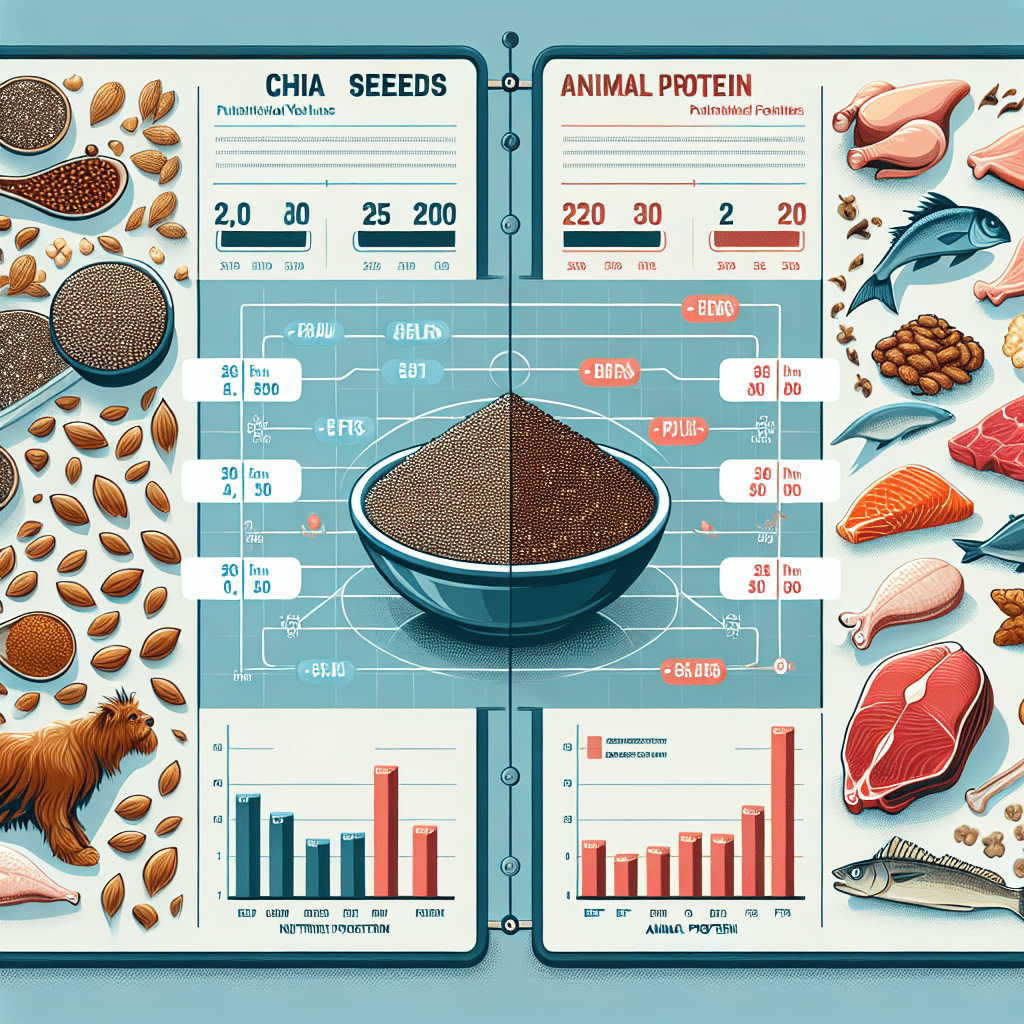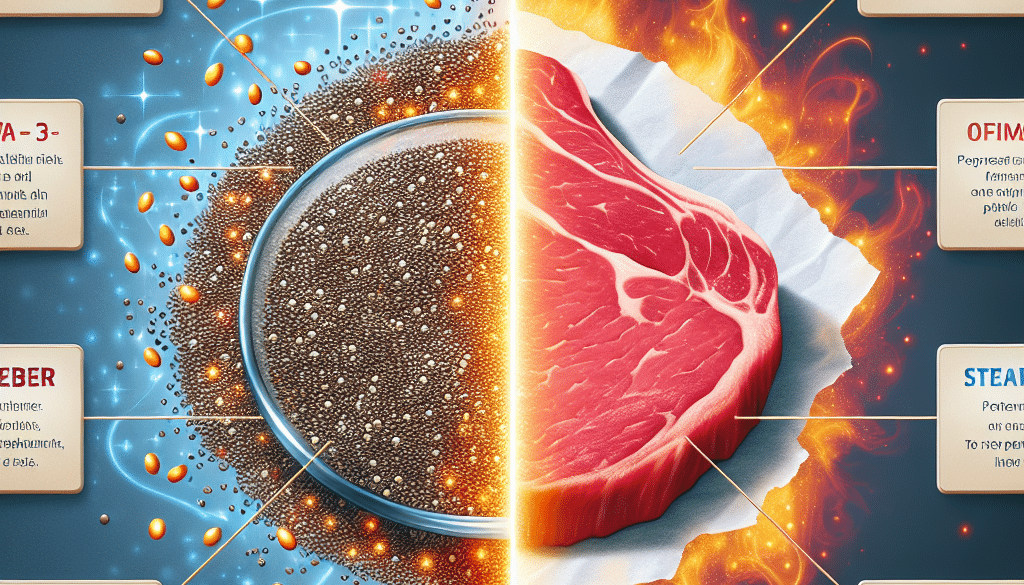Can Chia Seeds Beat Animal Protein?
-
Table of Contents
- Chia Seeds vs. Animal Protein: A Comprehensive Comparison
- Understanding Protein Quality
- Nutritional Profile of Chia Seeds
- Health Benefits of Chia Seeds
- Animal Protein: Benefits and Concerns
- Can Chia Seeds Replace Animal Protein?
- Sustainability of Chia Seeds vs. Animal Protein
- Conclusion: Balancing Protein Sources for Optimal Health
- Discover ETprotein’s High-Quality Protein Products
Chia Seeds vs. Animal Protein: A Comprehensive Comparison

Protein is a crucial macronutrient that plays a vital role in building and repairing tissues, making enzymes and hormones, and supporting overall health. While animal proteins have traditionally been the go-to source for many, plant-based alternatives like chia seeds are gaining popularity. This article delves into whether chia seeds can stand up to animal proteins in terms of nutritional value, health benefits, and sustainability.
Understanding Protein Quality
Before comparing chia seeds to animal proteins, it’s essential to understand what makes a protein source high quality. Protein quality is determined by its amino acid profile and digestibility. Animal proteins, such as meat, dairy, and eggs, are considered complete proteins because they contain all nine essential amino acids that the human body cannot produce on its own. Plant-based proteins often lack one or more of these essential amino acids, making them incomplete proteins.
Nutritional Profile of Chia Seeds
Chia seeds are a superfood known for their high fiber, omega-3 fatty acids, antioxidants, vitamins, and minerals content. When it comes to protein, chia seeds contain approximately 4 grams per tablespoon, making them a relatively high-protein plant food. However, unlike most animal proteins, chia seeds do not contain all essential amino acids in sufficient quantities, particularly lysine.
- High in fiber
- Rich in omega-3 fatty acids
- Good source of antioxidants
- Contains vitamins and minerals
Health Benefits of Chia Seeds
Chia seeds offer numerous health benefits that may not be as prominent in animal proteins. Their high fiber content aids in digestion and can help reduce the risk of chronic diseases such as type 2 diabetes and heart disease. The omega-3 fatty acids in chia seeds are beneficial for brain health and reducing inflammation. Additionally, chia seeds are naturally gluten-free and can be a great protein source for individuals with dietary restrictions.
- May reduce the risk of chronic diseases
- Beneficial for brain health
- Anti-inflammatory properties
- Gluten-free
Animal Protein: Benefits and Concerns
Animal proteins are well-known for their complete amino acid profiles and high bioavailability. They are essential for muscle growth, repair, and overall body function. However, there are concerns associated with animal protein consumption, including the environmental impact of livestock farming, ethical considerations regarding animal welfare, and potential health risks such as increased cholesterol levels and a higher likelihood of developing certain cancers.
- Complete amino acid profile
- High bioavailability
- Environmental impact of livestock farming
- Potential health risks
Can Chia Seeds Replace Animal Protein?
While chia seeds offer a good amount of protein and other health benefits, they cannot entirely replace animal protein for everyone. Individuals who rely solely on plant-based proteins must carefully plan their diets to ensure they receive all essential amino acids, possibly by combining different plant proteins or supplementing with vitamins and minerals.
For those looking to reduce their animal protein intake for health, environmental, or ethical reasons, chia seeds can be a valuable part of a balanced diet. They can be added to smoothies, yogurts, and baked goods to boost protein content and provide additional nutrients.
Sustainability of Chia Seeds vs. Animal Protein
One of the most compelling arguments for choosing chia seeds over animal protein is sustainability. Chia seeds require significantly less water, land, and resources to produce compared to livestock. They have a lower carbon footprint and can be grown in various climates, making them an environmentally friendly protein source.
- Lower water and land requirements
- Reduced carbon footprint
- Adaptable to various climates
Conclusion: Balancing Protein Sources for Optimal Health
In conclusion, while chia seeds offer numerous health benefits and are more sustainable than animal proteins, they cannot completely replace the nutritional value of animal proteins for everyone. A balanced approach that includes a variety of protein sources is often the best strategy for achieving optimal health and environmental sustainability. By incorporating chia seeds into a diet that also includes high-quality animal proteins or other plant-based proteins, individuals can enjoy the benefits of both worlds.
Discover ETprotein’s High-Quality Protein Products
If you’re looking to diversify your protein sources, ETprotein offers a range of organic bulk vegan proteins that can complement both plant-based and omnivorous diets. Their products, including organic rice protein, pea protein, and various seed proteins, are characterized by a neutral taste, non-GMO, and allergen-free attributes. With L-(+)-Ergothioneine purity over 98%, ETprotein caters to industries such as nutraceuticals, pharmaceuticals, and food and beverage, providing comprehensive solutions for all your protein needs.
Whether you’re a manufacturer, trader, or just someone interested in high-quality protein options, ETprotein’s offerings can help you meet your dietary and sustainability goals. Contact them today to learn more about their products and how they can support your health journey.
About ETprotein:
ETprotein, a reputable protein and L-(+)-Ergothioneine (EGT) Chinese factory manufacturer and supplier, is renowned for producing, stocking, exporting, and delivering the highest quality organic bulk vegan proteins and L-(+)-Ergothioneine. They include Organic rice protein, clear rice protein, pea protein, clear pea protein, watermelon seed protein, pumpkin seed protein, sunflower seed protein, mung bean protein, peanut protein, and L-(+)-Ergothioneine EGT Pharmaceutical grade, L-(+)-Ergothioneine EGT food grade, L-(+)-Ergothioneine EGT cosmetic grade, L-(+)-Ergothioneine EGT reference grade and L-(+)-Ergothioneine EGT standard. Their offerings, characterized by a neutral taste, non-GMO, allergen-free attributes, with L-(+)-Ergothioneine purity over 98%, 99%, cater to a diverse range of industries. They serve nutraceutical, pharmaceutical, cosmeceutical, veterinary, as well as food and beverage finished product distributors, traders, and manufacturers across Europe, USA, Canada, Australia, Thailand, Japan, Korea, Brazil, and Chile, among others.
ETprotein specialization includes exporting and delivering tailor-made protein powder and finished nutritional supplements. Their extensive product range covers sectors like Food and Beverage, Sports Nutrition, Weight Management, Dietary Supplements, Health and Wellness Products, and Infant Formula, ensuring comprehensive solutions to meet all your protein needs.
As a trusted company by leading global food and beverage brands and Fortune 500 companies, ETprotein reinforces China’s reputation in the global arena. For more information or to sample their products, please contact them and email sales(at)ETprotein.com today.












